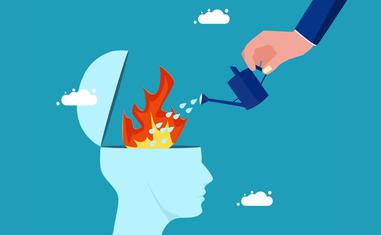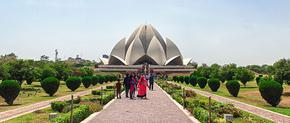The views expressed in our content reflect individual perspectives and do not represent the authoritative views of the Baha'i Faith.
Ever feel so enraged you just want to boil over? Hit something? Lash out at the world? Well, it turns out, so do millions of other people right now. Our rage pandemic cries out for useful peacemaking solutions.
Have you noticed it?
Anger, wrath, and rage seem to be all the rage lately. We vent freely, scream at the guy on the freeway who cuts us off, even do violence to inanimate objects, or God forbid to other people, all in our quest to let our rage out. Our civic life, our politics, and even our public institutions have become rage-filled, too.
RELATED: Anger and Jealousy Prevention: How to Avoid Lion Attacks
Yes, anger may be cathartic, but when it’s expressed as rage it can also be intensely damaging, not only to the object of your rage but to you.
If we aspire to become decent human beings (and stay out of prison, too), we have to find a way to gain what the psychologists call “a locus of self-control.” Children often struggle with that task, but as adults, the world expects us to operate within the bounds of acceptable social behavior, and not slug the boss or destroy property or fly into a violent fit or harm others, regardless of the provocation. There are laws against that kind of thing, after all.
We have to find ways, if we expect to make it through life intact, to sign a peace treaty with our feelings.
It’s possible to make peace with our own inner rage – but first we need to recognize the mechanism that triggers it. We all have what psychologists call “rage circuits” in our brains. Every human being possesses those circuits, built in from the factory.
In fact, those circuits once helped us, allowing our species to get this far in human history.
How? Well, when our brains sense a threat to our existence – say, impending invasion by a fierce competing tribe of cavemen, or the sudden appearance of a voracious beast, or the snarky insults of a cynical keyboard warrior – those attacks trigger a built-in fight-or-flight response. We naturally respond to the dangers in our environment, just like any living being would. When that happens, our brains flood our bodies with adrenaline, which enables us to perform unlikely feats – run away faster than ever before, lift cars off injured pedestrians, or respond with rage and even violence.
Baha’u’llah, the prophet and founder of the Baha’i Faith, quoted by Dr. J.E. Esslemont in his book Baha’u’llah and the New Era, said:
Verily the most necessary thing is contentment under all circumstances; by this one is preserved from morbid conditions and from lassitude. Yield not to grief and sorrow: they cause the greatest misery. Jealousy consumeth the body and anger doth burn the liver: avoid these two as you would a lion.
Good advice, because while rage may have paid dividends in the age of cavemen with clubs, today it will get you a jail sentence or a casket – which means adrenaline-fueled rage has changed from an evolutionary advantage to a dire disadvantage. From caves to condos, rage has lost the plot. Now we have to lose our rage.
We know that adrenaline is still a powerful force, however, and the neural circuits it excites – especially the ones in the amygdala, our so-called “lizard brain,” which functions as the seat of our strongest emotions – can produce tremendous, unexpected rage, all of a sudden. This happens especially when we’ve suppressed past anger, slights, and insults – when that occurs, rage can build and bust loose.
So when you hear about someone completely losing it – attacking a flight attendant, striking out at fellow students at school, slandering others on social media – it generally means that their anger triggers got the best of them, overpowering their rational and spiritual sides. Of course, those kinds of stress-inducing rage triggers exist everywhere these days. We perceive that the social order itself is collapsing; that our lives are in danger from war or climate change or economic peril; that the political environment is poisonous; and that we live in a dystopian age. That’s enough, right there, to make anyone upset.
So what’s the solution?
RELATED: Learning How to Control Our Anger
Here, gleaned from both science and spirituality, are three suggestions:
1. Everyone Feels Rage
First, recognize that we all have a deep well of strong emotions within us. Every human being possesses the potential for rage. Civilization has allowed us to subdue some of those emotions some of the time – but anger, when suppressed, can emerge as passive-aggressiveness, sudden temper tantrums, or even self-destructive, violent behavior. The Baha’i teachings say that these feelings of anger, aggressiveness, and rage are shared by every human being. Abdu’l-Baha, the son and successor of Baha’u’llah, in his book Some Answered Questions, said:
In this material world, man is subject to the force of instinctual desires … The body of man is a prisoner of nature and will act in accordance with whatever nature dictates. It follows that sins – such as wrathfulness, envy, contentiousness, greed, avarice, ignorance, rancour, corruption, pride, and cruelty – must exist in the material world. All these bestial attributes exist in the nature of man. A man who has been deprived of spiritual education is even as an animal … on this plane man is indistinguishable from the animal.
This means that it’s up to us and our higher intellectual and spiritual powers to not only control our rage, but to reduce it by replacing it with higher human characteristics, and ultimately to turn the anger we feel in our emotional and intellectual lives to good purposes.
2. Everyone has Noble Attributes
Second, after recognizing our lower natures, and acknowledging that we each have an animal side to our existence, we can begin aspiring to develop their opposites – our higher, nobler, more spiritual attributes. We all have them, at least potentially, and their development is up to us. We can each decide whether to be kind or cruel, loving or hateful, understanding or angry, compassionate or hard-hearted. In fact, in the workshop of life, we get the opportunity many times each day to make these essentially spiritual choices.
This constant process of refining our souls constitutes the true immortalizing work of every person in this world, according to the writings of Baha’u’llah, the prophet and founder of the Baha’i Faith:
From the exalted source, and out of the essence of His favor and bounty [God] hath entrusted every created thing with a sign of His knowledge, so that none of His creatures may be deprived of its share in expressing, each according to its capacity and rank, this knowledge. This sign is the mirror of His beauty in the world of creation. The greater the effort exerted for the refinement of this sublime and noble mirror, the more faithfully will it be made to reflect the glory of the names and attributes of God, and reveal the wonders of His signs and knowledge.
When we make the daily effort to polish our inner spiritual mirrors, Baha’u’llah points out, we do so by gradually developing the noblest attributes in our souls. This doesn’t happen in a day – it takes a long-term commitment to be a loving and peaceful and happy human being, tethered to noble spiritual values and determined to become better humans.
3. Turn Anger into Constructive Action
Abdu’l-Baha suggested in Some Answered Questions that we all have noble and righteous ways available to us to express and expend the natural anger and rage we feel:
In the innate nature of things there is no evil – all is good. This applies even to certain apparently blameworthy attributes and dispositions which seem inherent in some people, but which are not in reality reprehensible. For example, you can see in a nursing child, from the beginning of its life, the signs of greed, of anger, and of ill temper; and so it might be argued that good and evil are inherent in the reality of man, and that this is contrary to the pure goodness of the innate nature and of creation. The answer is that greed, which is to demand ever more, is a praiseworthy quality provided that it is displayed under the right circumstances. Thus, should a person show greed in acquiring science and knowledge, or in the exercise of compassion, high-mindedness, and justice, this would be most praiseworthy. And should he direct his anger and wrath against the bloodthirsty tyrants who are like ferocious beasts, this too would be most praiseworthy. But should he display these qualities under other conditions, this would be deserving of blame.
That’s one of our biggest challenges here on this physical plane of existence – to turn our feelings of rage into a quest that seeks justice for all humanity. This path doesn’t require violence or retribution or even the physical expression of our wrath – instead, it calls for the courageous expression of love and altruism in pursuit of global unity, peace, and justice.

















Comments
Sign in or create an account
Continue with Facebookor